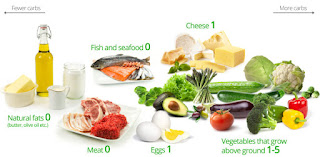The truth is reducing your weight has hardly ever been easy. Many persons start their change journey from excess fat to fit with sheer passion and energy. But as they get deeper to the roots of diet and training, they have almost run out of zeal and determination.
While others who tend to stick for a long duration of a rigid diet and rigorous workout have hardly any clue on how to maintain the shape they have achieved. And once they get off the track, there’s no way they are returning to rigid diet plans.
The Low-Carb Indian Diet Plan to Lose Weight
One word - It works. Put just, when you consume fewer calories than you spend, your body seems to burn your excess fat stores, and you start to drop excess weight (along with some muscle tissue).
Low-Carb Diets are very likely to succeed and provide you with the results you always dreamt about. However, just when you are not allowed to eat much does not mean you can munch on junk foods and wait for good results.
You should always opt for a balanced diet that includes sufficient proportion of vitamins, minerals, fibers and other essential nutrients.
An Ideal 1200 Calorie Indian Diet for Vegetarians
Breakfast - 1 bowl oatmeal or dairy + 1 medium size banana or 10 grapes
Total Calories - 264
Lunch - 2 slice of whole wheat bread + 1 cup chickpeas + ½ cup carrots + ½ cup non-fat cheese
OR
1 cup salad with avocado, carrots, tomato, and leafy greens + ½ cup black bean soup + ½ cup Greek yogurt, unsweetened (add to soup and spoon some beans onto the chapatis) + 1 chapatis.
Total Calories - 370
Snacks - 1 cup tea + 1 bowl poha
Total Calories - 220
Dinner - Brown Rice 2 cup + 1 bowl mixed veggies + 1 bowl salad + 1 small bowl Raita
Total Calories - 350
An Ideal 1800 Calorie Indian Diet for Vegetarians
Early Morning - 1 cup of warm tea or 1 cup skimmed milk + 1 small methi (fenugreek) parantha
Breakfast - 1 bowl curd or 2 glass of buttermilk + 2 bowls poha 0r two bowl oats + 2 egg whites or 25g paneer + 1 small size fruit + 1 tablespoon oil/butter
Snacks - 1 medium size apple/orange or medium slice of papaya
Lunch - 3 medium chapatis + 1 bowl cooked rajma (red kidney beans) + 2 bowl mix vegetable salad + 1 bowl curd + 2 tablespoon oil
Snacks - 1 cup of coffee or warm tea + 2 cream cracker biscuits
Dinner - 2 medium chapattis + 1 bowl soybean nuggets + 1 bowl cooked vegetables + 1 bowl salad + ½ cup mixed slice fruit + 2 tablespoon oil/butter
Bedtime - 1 cup of milk or 1 bowl of curd
A common low-calorie diet can be based on the concept of counting total calories consumed irrespective of its source. So, as long as you stay near to 1200 calories a day, you can eat whatever you wish.
One major advantage of following a low to very low-calorie diet can be that now you don’t need to indulge in heavy workout sessions daily. Just a couple of total body workout or even aerobic sessions would do fine for your excess weight loss goals.

Comments
Post a Comment